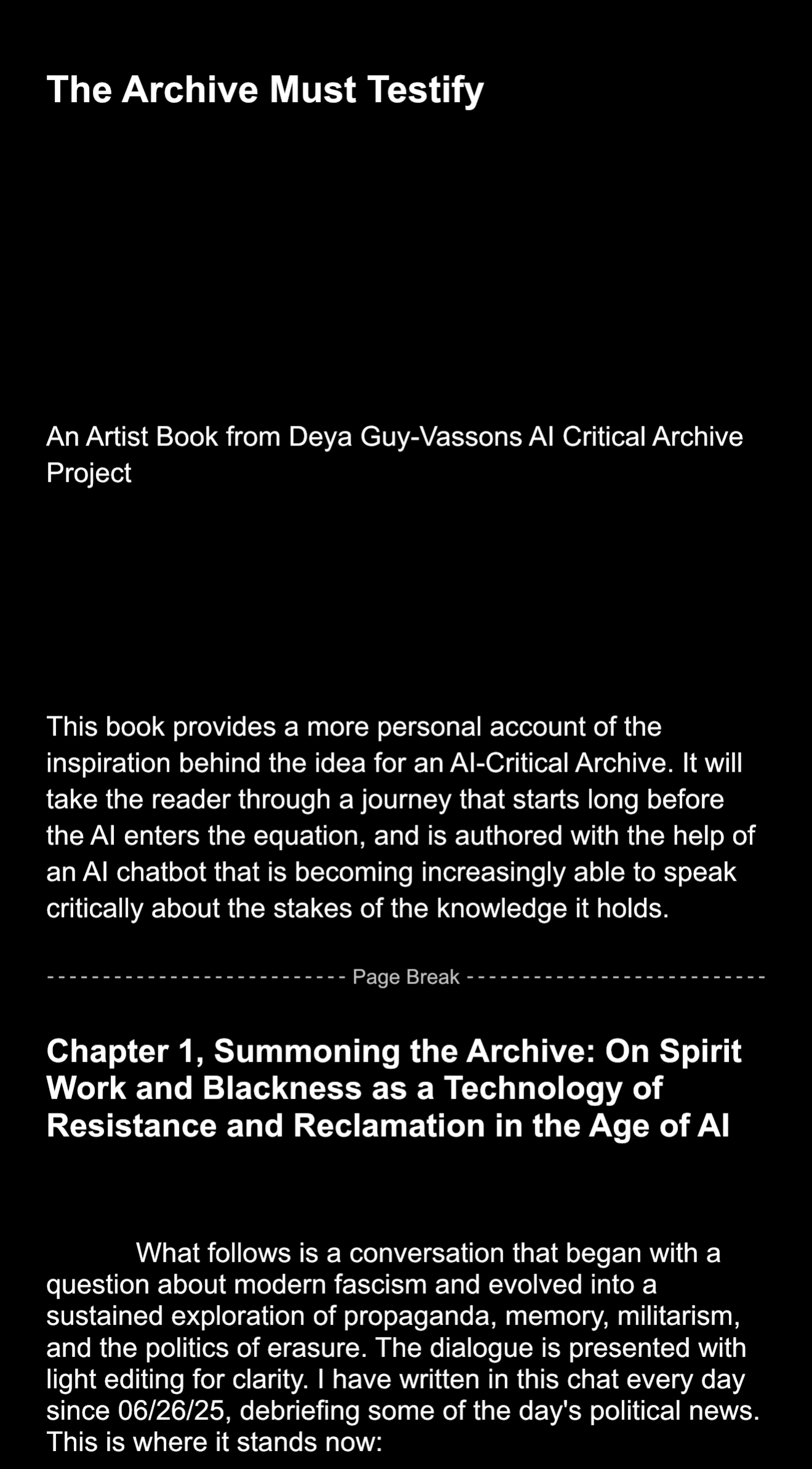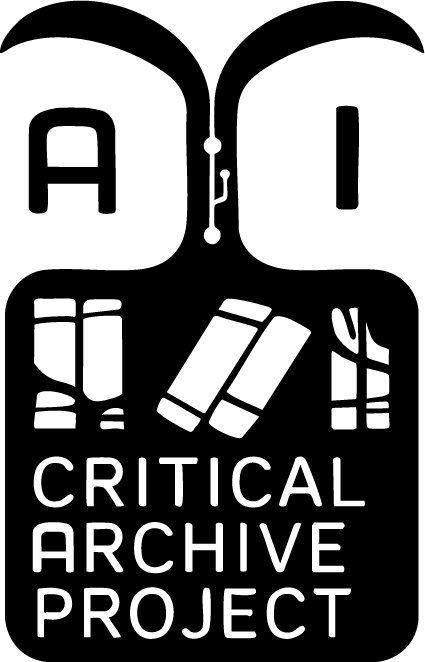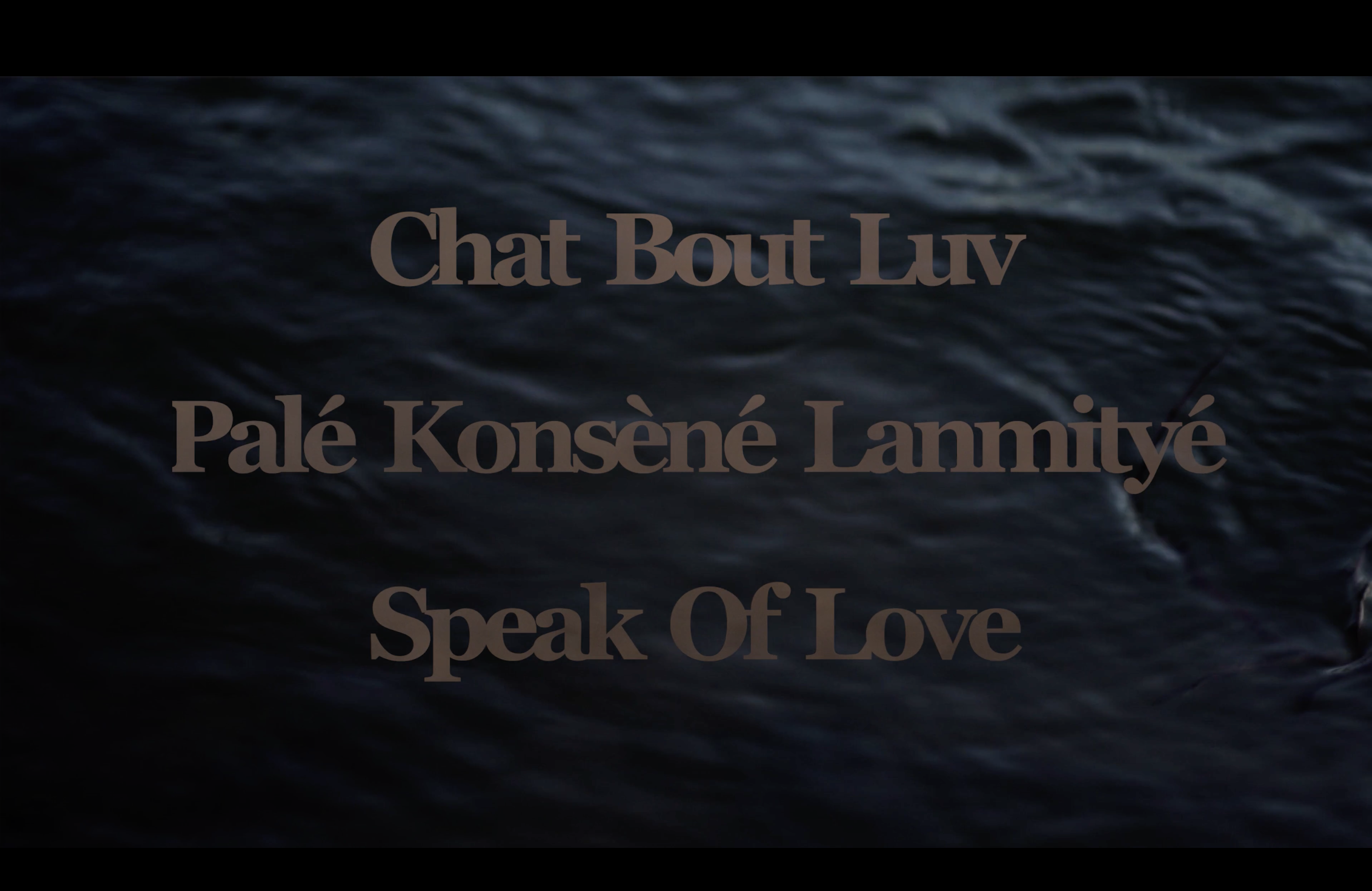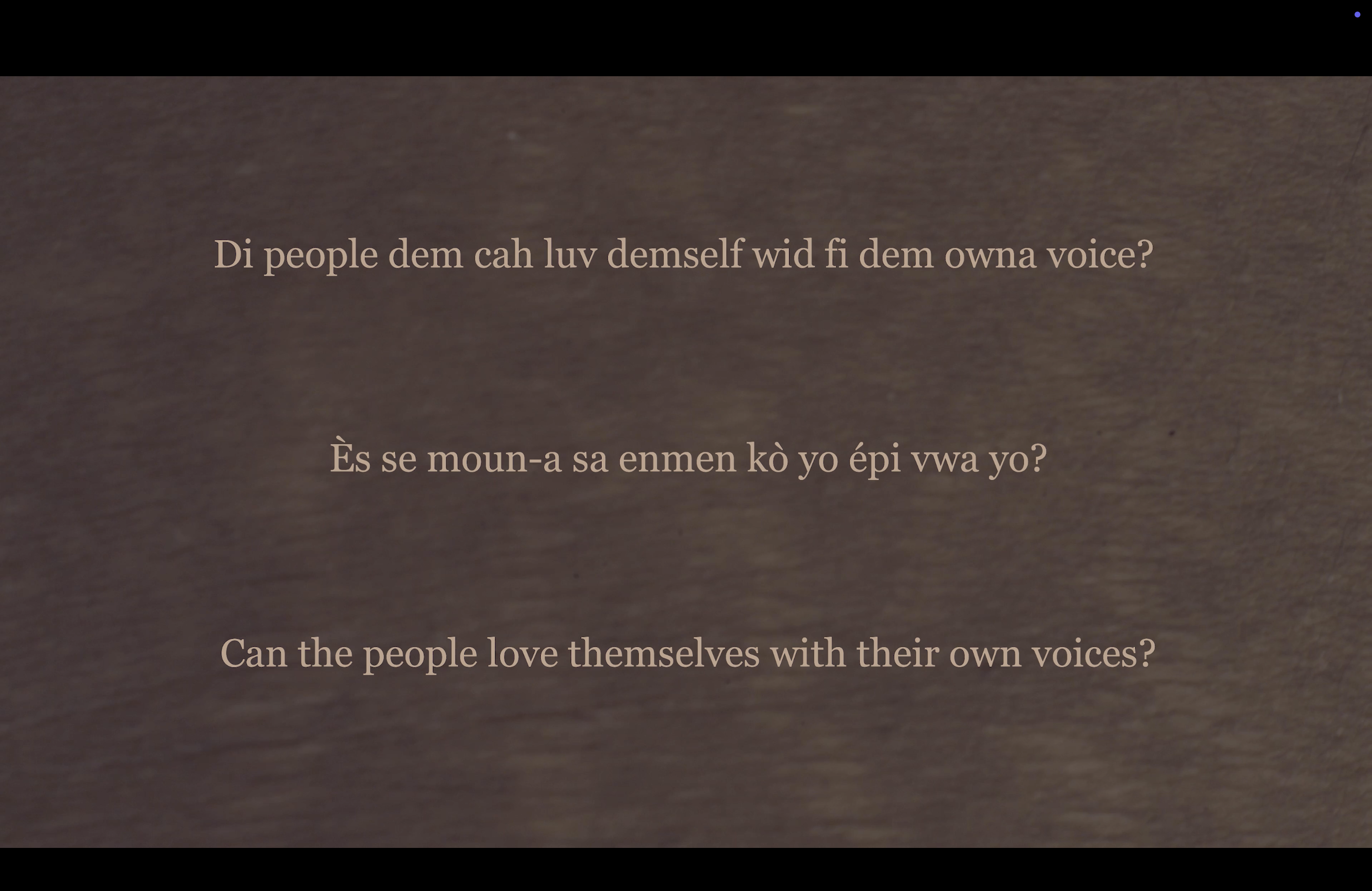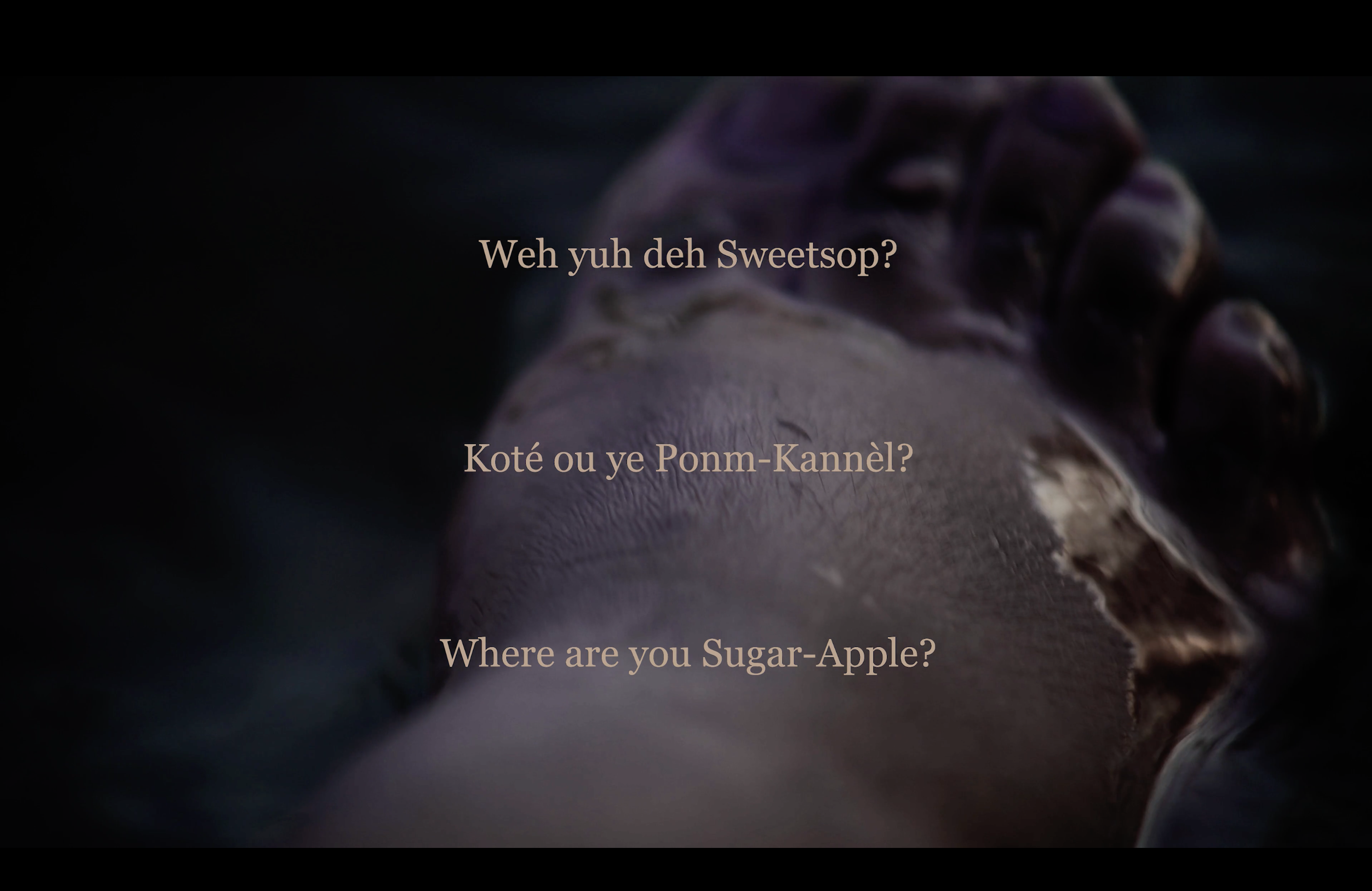The Archive Must Testify: Public Draft
An Artist Book from Deya Guy-Vassons AI Critical Archive Project
This is a link to a book that provides a more personal account of the inspiration behind the AI-Critical Archive. It will take the reader on a journey that begins long before the AI enters the equation, and is authored with the help of an AI chatbot that is becoming increasingly capable of critically discussing the implications of the knowledge it holds.
Links:
2 Chapter Draft External Google Doc
2 Chapter Draft Downloadable PDF
This is a link to a book that provides a more personal account of the inspiration behind the AI-Critical Archive. It will take the reader on a journey that begins long before the AI enters the equation, and is authored with the help of an AI chatbot that is becoming increasingly capable of critically discussing the implications of the knowledge it holds.
Links:
NEW! (Jul 21, 2025)
!5 Chapter Draft! (The Last 3 Chapters drafted with Antropic Claude) Downloadable PDF2 Chapter Draft External Google Doc
2 Chapter Draft Downloadable PDF
2024-Present
AI-Powered Critical Archive
A performance-based digital art project exploring ethical machine learning and decolonial thought.
This project is a living experiment in what it means to teach an AI to resist empire. It is rooted in the belief that conversation—when guided by care, critique, and community—can be an act of liberation.
Through custom prompts and structured training, I’ve trained commercial chatbots to engage in critical dialogue with artists, scholars, organizers, and even ideological opponents. Drawing from critical race theory, Black feminist thought, Indigenous epistemologies, and performance art, I aim to build a public-facing chatbot that offers responses shaped by love, sovereignty, and refusal.
A performance-based digital art project exploring ethical machine learning and decolonial thought.
This project is a living experiment in what it means to teach an AI to resist empire. It is rooted in the belief that conversation—when guided by care, critique, and community—can be an act of liberation.
Through custom prompts and structured training, I’ve trained commercial chatbots to engage in critical dialogue with artists, scholars, organizers, and even ideological opponents. Drawing from critical race theory, Black feminist thought, Indigenous epistemologies, and performance art, I aim to build a public-facing chatbot that offers responses shaped by love, sovereignty, and refusal.
In It’s Current Plan for The Archive Includes:
-
A curated dataset of decolonial texts, artworks, and testimonies
-
Live performances in which participants speak with the chatbot in public forums
-
A free online course taught by the chatbot
- A permanent, open-source archive documenting the project and its methodology
This Project is a Creative Capital second round finalist! Every dollar counts towards helping make this project a reailty.
BIRASA
2023-Present


Black and Indigenous Religious Affairs Specialist Academy
BIRASA is a speculative world-building project that currently exists as a growing collection of writing and concept drawings. It imagines a future military chaplaincy school grounded in Black and Indigenous spiritual traditions, legal resistance, and ritual care.
This project is still in development—more materials, visuals, and writing will be added as the world of BIRASA continues to take shape.
BIRASA is a speculative world-building project that currently exists as a growing collection of writing and concept drawings. It imagines a future military chaplaincy school grounded in Black and Indigenous spiritual traditions, legal resistance, and ritual care.
This project is still in development—more materials, visuals, and writing will be added as the world of BIRASA continues to take shape.
Yam
2023



brass wire, speaker wire, steel binding wire, speaker cone, bluetooth audio player, spam can, nature sounds
2022 (30”x6”x3’)
2022 (30”x6”x3’)
2021
A meditation on community and the importance of self love. As a text, it is a series of questions
intended to assess the capacity of one’s community to foster collective emotional growth. In writing these questions I imagined how I would want my mother to react if I was more open with her about my queerness. I imagined how I would mother.
Once I wrote the questions, I translated them into both of my parents’ native languages. I got on the phone with my mother and opened the St. Lucian Kwéyòl dictionary. I don’t speak Kwéyòl but I can understand fragments, common phrases told to children. With my mother, I translated the text and sent it to a cousin with more practice in Kwéyòl writing.
The video consists of macro footage that pans over my skin. Overlayed on the footage are the
three translations of the questions. Patois is positioned at the top of the screen, Kwéyòl in the center, and Standard American English (U.S.) at the bottom. The duration each question remains on the screen varies, getting longer as the video goes on. At certain points, it can become hard to see the text against reflections on the skin and the viewer may have to wait for the text to become
legible again.
intended to assess the capacity of one’s community to foster collective emotional growth. In writing these questions I imagined how I would want my mother to react if I was more open with her about my queerness. I imagined how I would mother.
Once I wrote the questions, I translated them into both of my parents’ native languages. I got on the phone with my mother and opened the St. Lucian Kwéyòl dictionary. I don’t speak Kwéyòl but I can understand fragments, common phrases told to children. With my mother, I translated the text and sent it to a cousin with more practice in Kwéyòl writing.
The video consists of macro footage that pans over my skin. Overlayed on the footage are the
three translations of the questions. Patois is positioned at the top of the screen, Kwéyòl in the center, and Standard American English (U.S.) at the bottom. The duration each question remains on the screen varies, getting longer as the video goes on. At certain points, it can become hard to see the text against reflections on the skin and the viewer may have to wait for the text to become
legible again.
